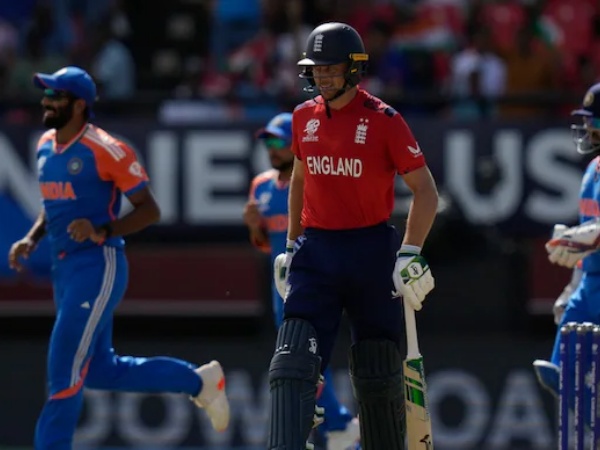T20 World Cup 2024: Michael Vaughan Slams England After Loss To India
In the highly anticipated Semi-final 2 of the T20 World Cup 2024 between India and England, the scene was set against a backdrop of inclement weather. Rain threatened to disrupt play, casting doubt over the match's progression. However, following several inspections by match officials, a decision was made to proceed, despite the ominous clouds overhead. England won the toss and elected to bowl first, a choice that drew acknowledgment from India's captain, Rohit Sharma, who indicated his team was prepared to bat regardless of the conditions. Despite early setbacks where England's bowlers applied pressure by claiming key wickets, India managed to compile a competitive total of 171 runs. Their innings was marked by resilience and strategic batting adjustments in response to the challenging pitch conditions. The Indian spinners, particularly adept on the slower surface, then took center stage during England's chase.
In stark contrast to India's innings, England's batting order faltered under the pressure exerted by the Indian spinners. The pitch, as predicted, played increasingly slower as the match progressed, a factor that significantly hindered England's ability to chase down the target. Their batting lineup crumbled swiftly, collapsing to a mere 103 runs within just 17 overs.
Following England's defeat, former England captain Michael Vaughan was vocal in his criticism of the decision to bowl first, suggesting it was ill-advised given the deteriorating nature of the pitch. His comments underscored the strategic misstep that ultimately contributed to England's downfall in the crucial semi-final encounter of the T20 World Cup.
“My belief is that England’s issues with these conditions run a bit deeper than just the coach and captain. They made some mistakes. It was a curious decision to bowl at the toss. I am sure the dodgy weather played its part, but on a dry pitch like that against India’s spinners, surely you bat first. Perhaps England were stuck in their ways because they chased so well against India in Adelaide two years ago,” former England cricketer Michael Vaughan wrote in his column for The Telegraph.
Indian spinners Axar Patel and Kuldeep Yadav proved pivotal, each claiming three wickets as they dismantled England's batting lineup. Kuldeep Yadav exploited the English batsmen's penchant for cross shots, which ultimately led to their downfall, repeatedly surrendering their wickets. England's captain, Jos Buttler, fell victim to Axar Patel's guile when his attempted reverse sweep ended in dismissal.
Michael Vaughan did not mince words in his criticism, attributing England's poor performance to their lack of athleticism and inability to adapt their power-based batting approach to slower pitches. According to Vaughan, these shortcomings have consistently undermined England's chances in crucial matches. His remarks highlighted a broader concern about England's strategy and execution under challenging conditions, a sentiment echoed by many observers following their disappointing exit from the T20 World Cup semi-final.
“But there are three key issues in these conditions for England. First, they are not a great fielding team, and do not have enough athletes. They had a couple of good moments, but are way below South Africa’s level. With the bat they lack the power-game on slower pitches, and with the ball they are a bit predictable. It’s a bit unfair to compare them to Jasprit Bumrah, the best in the world, but how many of our seamers have slower balls that completely deceive the batsman?,” Vaughan added.
